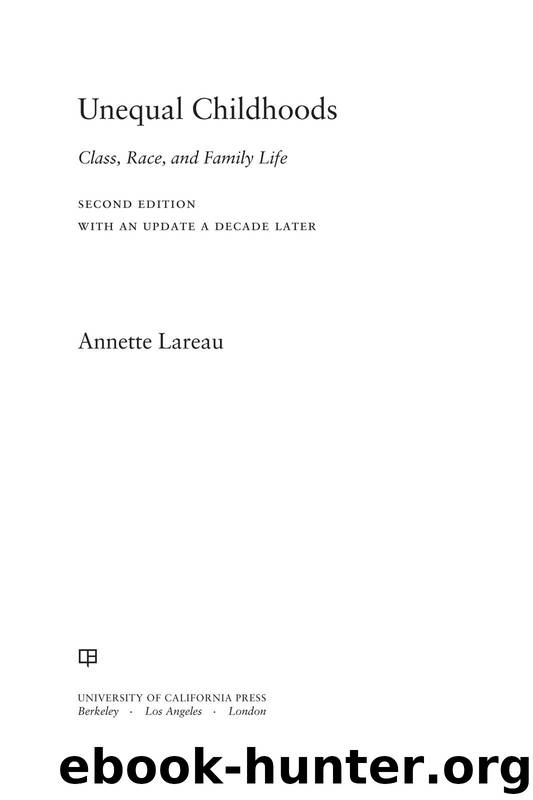Unequal Childhoods by Annette Lareau

Author:Annette Lareau
Language: eng
Format: mobi, epub
ISBN: 9780520271425
Publisher: University of California Press
Published: 2011-01-04T10:00:00+00:00
WORRYING ABOUT BEING TURNED IN
This general feeling of unease with the school would, at times, explode into a crisis when the physical discipline practiced at home made them vulnerable for intervention by the school. In family life, the Yanellis gave directives: “Billy don’t do that” or “Billy cut it out.” They often did not provide reasons. Even when they did provide reasons, they were much briefer than in the Tallinger family. Parents did not, for example, draw out Billy and encourage him to think through the implications for himself. Instead, the parents stated the explanation in a brief fashion (if they provided one at all). Moreover, Ms. Yanelli (who did virtually all of the disciplining) found it helpful to pick up a belt when Billy was exasperating her. This fundamental strategy for child rearing—directives and physical punishment—was not in keeping with the standards promoted by professionals. For example, on this Wednesday in early May, Ms. Yanelli quarreled with her son over his homework. He was working (with the television on) in a slow-paced fashion at 8:00 P.M., although he had started much earlier.
MOM: Billy, please finish that homework. It’s 8:00 almost. I’m going to shut the TV off. What number are you on? What time did you start your homework?
BILLY: 5:00.
MOM: If you started at 5:00 you should be done at 6:00.
MOM: Billy answer me. Tell me where you’re at. (She sounded upset.)
A bit later, Little Billy finished his homework and began a game of Scrabble with his mother and the researcher. This became the source of a new conflict:
MOM: It’ll be time for your shower when you’re finished.
BILLY: We’re playing Scrabble.
MOM: You’re getting a shower. Then you can play Scrabble. (Mom’s voice was loud and she sounded angry.)
Billy finishes his homework and his mother, the field-worker, and Billy begin a game of Scrabble. Before the game is done, Ms. Yanelli tells Billy it is time for his shower. He ignores. After repeatedly telling Billy to get in the shower his mother got out a belt.
MOM: Billy shower. I don’t care if [you] cry, scream.
BILLY: We’re not done [with the Scrabble game].
MOM: You’re done. Finish your homework earlier.
(Billy stays seated.)
MOM: Come on! Tomorrow you’ve got a big day. (Billy didn’t move.)
Mom went in the other room and got a brown leather belt. She hit Billy twice on the leg . . . Billy was sitting between Big Billy and [the researcher]. Big Billy and [his friend] Tom watched. She said, “Get up right now. Tomorrow I can’t get you up in the morning. Get up right now.” Billy got up and ran up the steps.
In all of these extended interactions there were elements of reasoning, in the sense that Ms. Yanelli explained why she demanded various behaviors from Billy. Nevertheless, the fundamental process emphasized a series of directives (i.e., “Billy shower,” “you’re done”). Most important, when the mother felt her son was not sufficiently responsive, she found the force of physical discipline to be a valuable resource. Although Mr. Yanelli was an observer, rather than participant, in these interactions he was supportive of the approach.
Download
This site does not store any files on its server. We only index and link to content provided by other sites. Please contact the content providers to delete copyright contents if any and email us, we'll remove relevant links or contents immediately.
| General | Discrimination & Racism |
Nudge - Improving Decisions about Health, Wealth, and Happiness by Thaler Sunstein(7706)
The Fire Next Time by James Baldwin(5445)
iGen by Jean M. Twenge(5416)
Adulting by Kelly Williams Brown(4574)
The Sports Rules Book by Human Kinetics(4386)
The Hacking of the American Mind by Robert H. Lustig(4383)
The Ethical Slut by Janet W. Hardy(4253)
Captivate by Vanessa Van Edwards(3839)
Mummy Knew by Lisa James(3691)
In a Sunburned Country by Bill Bryson(3542)
The Worm at the Core by Sheldon Solomon(3487)
Ants Among Elephants by Sujatha Gidla(3467)
The 48 laws of power by Robert Greene & Joost Elffers(3291)
Suicide: A Study in Sociology by Emile Durkheim(3022)
The Slow Fix: Solve Problems, Work Smarter, and Live Better In a World Addicted to Speed by Carl Honore(3009)
The Tipping Point by Malcolm Gladwell(2922)
Humans of New York by Brandon Stanton(2873)
Get What's Yours for Medicare: Maximize Your Coverage, Minimize Your Costs by Philip Moeller(2732)
Handbook of Forensic Sociology and Psychology by Stephen J. Morewitz & Mark L. Goldstein(2705)
